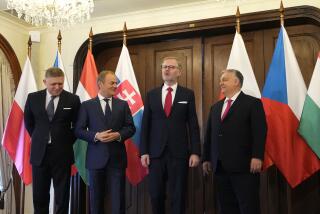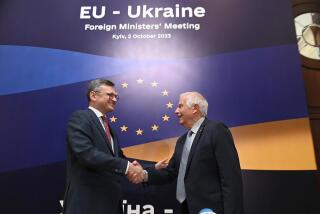EC Officials Express Hope for Accord : Yugoslavia: The European group is optimistic, but in the divided nation its plan goes unheeded.
- Share via
LUXEMBOURG — Western European leaders, fresh with promises from Yugoslav officials that they would step back from the brink of civil war, expressed hope Saturday that they may have helped engineer the beginning of the end of the crisis.
Jacques Poos of Luxembourg, one of three European foreign ministers who were dispatched to Yugoslavia late Thursday, spoke optimistically upon his return here about an accord he said they achieved there.
But in Yugoslavia, none of the points of the agreement were being heeded Saturday, and fighting continued between forces of the breakaway republic of Slovenia and the federal army.
Speaking at the end of a two-day meeting of the leaders of the 12 European Community nations, British Prime Minister John Major acknowledged that the Yugoslav situation remains “very fragile indeed.” And German Chancellor Helmut Kohl described himself as optimistic but not euphoric.
Many officials acknowledged that any apparent relaxation of tensions from the mission of the three foreign ministers might prove fleeting.
A U.S. official in Luxembourg said: “The Europeans have thrown the Yugoslavians a lifeline, but whether they take it remains to be seen.”
The EC leaders, addressing a number of the world’s other hot spots, also:
* Demanded “one more time” that Soviet leaders enter into serious negotiations to meet “the legitimate aspirations of the Baltic peoples” in Latvia, Lithuania and Estonia who are pressing for independence.
* Agreed to let EC nations resume sports contacts with South Africa now that the South African government has acted to demolish the last legal pillars of apartheid. But the EC leaders also urged the government to solve the knotty problems of political prisoners and exiles.
* Expressed hope that the EC could agree to a form of loose affiliation with Poland, Czechoslovakia and Hungary by the end of October.
The Yugoslav crisis dominated the two-day meeting. The EC foreign ministers who were sent to Yugoslavia on Friday met first with Yugoslav Prime Minister Ante Markovic and Slobodan Milosevic, president of the Serbian republic, in Belgrade, and then with the presidents of Slovenia and Croatia in the Croatian capital of Zagreb.
“We have good hopes, but it remains to be translated into deeds,” said Netherlands Foreign Minister Hans van den Broek, one of the three foreign ministers, as he returned to Luxembourg.
“We know that we cannot solve the problems of the Yugoslav politics in one night of discussion,” added Luxembourg’s Poos.
Poos said the EC maintained its threat to cut off about $1 billion in EC aid to Yugoslavia and another $3 billion in aid from the 12 member nations.
“If the results are positive, naturally there will be no reason to freeze aid,” he said, adding that the foreign ministers had made it clear to the Yugoslav federal government that “if there are no results, aid will be suspended immediately.”
Despite asserting themselves on Yugoslavia, however, the EC leaders made no apparent progress toward one of their goals for this year: the establishment of a regular mechanism for setting EC-wide foreign and security policy.
EC President Jacques Delors, the leading advocate of such an approach, said it remains necessary for the EC to “institutionalize” Europe’s diplomatic decision-making procedures so that the Continent can consistently play a major role on the world stage.
He said his hopes are fading that the 12 sometimes-divergent EC countries can work out a formula by the end of this year.
Researcher Isabelle Maelcamp contributed to this story.
More to Read
Sign up for Essential California
The most important California stories and recommendations in your inbox every morning.
You may occasionally receive promotional content from the Los Angeles Times.













